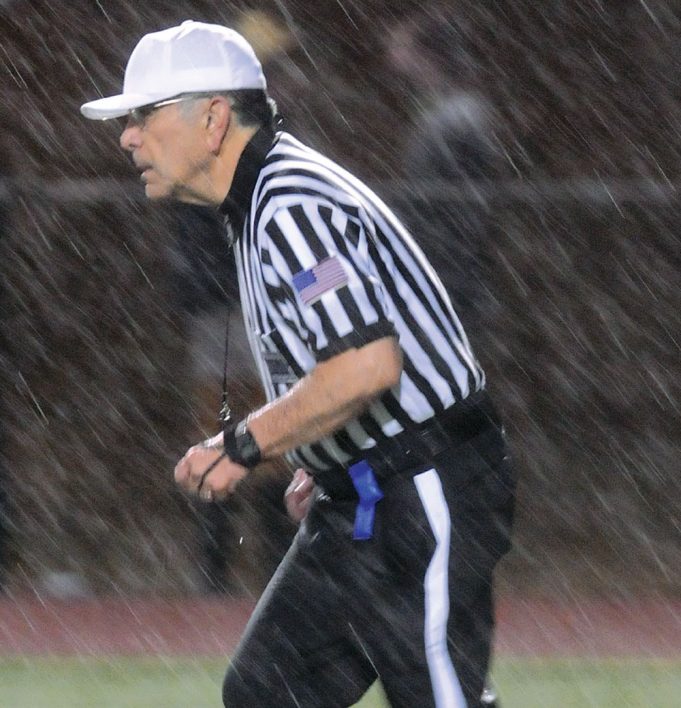Officials are quitting at record rates and many veteran officials have testified sportsmanship has become much worse over the years. Others want to stay connected to the game they love, but are ill-equipped to successfully navigate the inevitable turmoil.
It’s important to note officials must recognize they will never be able to completely control others’ behaviors; they instead will only be able to manage difficult situations. Nothing we say or do will fundamentally change fan, coach or player behavior during the course of the game.
Take care of what we can control. Instead of focusing on external factors we cannot control, we can examine and develop the components that are wholly within our circle of influence.
Imagine you decided to tackle the Tour du Mont Blanc, a 110-mile hike through France, Italy and Switzerland. A shrewd person would study maps, research blogs and testimonials from previous hikers, purchase essential equipment, formulate a schedule, develop meal plans and reserve accommodations at appropriate intervals. The person would also design a fitness regimen to ensure he or she was in peak condition to undertake the physically challenging quest. It’s safe to imagine an untrained and ill-equipped hiker would encounter many more obstacles than one who had meticulously prepared.
The hiker cannot control the weather, airline schedules or behavior of other hikers on the trail. However, by minimizing or eliminating variables that are well within the hiker’s span of control, the hiker can completely focus on the task ahead and on managing unforeseen events.
The same concept applies to officials. There are multiple factors an official will not be able to control, such as the maturity level of fans, players and coaches. Officials working outdoor sports cannot flip a switch to shut off rain, snow, cold and wind. Instead, officials must strive to eliminate or minimize unwanted variables over which they have complete control.
The adage “proper preparation and planning prevents poor performance” is definitely relevant to officials. Learning and preparation will always precede successful decision-making. It’s inconceivable an official would step on the playing surface in poor shape or with incomplete rules and mechanics knowledge, but it happens all the time, with predictable results.
Adjust a misplaced sense of righteousness and justice. Officials have “positional authority” and possess distinct status as game arbiters. Some officials become offended because they are not afforded the respect and dignity they feel they deserve based on their status. That feeling of self-importance inhibits an objective response when fans, players or coaches undermine their positional authority.
Some may also believe they are solely responsible to preserve the integrity of the game; if they tolerate any undesirable behavior, mayhem will ensue. The axiom, “What you permit, you promote,” is overly simplistic and infers that an official’s decision to offer grace will somehow invite anarchy. We are grateful when a police officer lets us off with a warning after a traffic stop, but some of us seem to think any grace on the playing field will somehow damage the game. Each rulebook clearly outlines essential behavioral tenets; many of which are absolutes. Some decisions must be black and white, but the majority of our judgments will be less than clear-cut. Swift justice does not always have to be meted out for indiscretions.
Develop and adhere to principles. Standards and principles are the foundation for our conduct. As we develop sound behavioral principles, we can be more precise and less arbitrary with our decisions and we can take emotion completely out of the equation when we encounter an agitating situation. As much as possible, crews and local associations should develop the same set of principles. Officials on a crew should strive to mirror “benchmark” crew decisions and should attempt to provide a consistent set of rulings. But it’s understandable each official on the crew may have distinct ideologies and attitudes. The key is to take the time to thoughtfully consider and establish principles to avoid impulsive reactions. Establishing principles is also relevant when communicating with coaches.
Foster teamwork, trust and loyalty. The human body’s tissues organs and systems are organized and work in harmony to maximize performance. An officiating crew is very much like a living organism. Crew teamwork, trust and loyalty are vital to success. When a crew believes in, trusts and supports one another and fosters a “we’re in this together” and “I have your back” mentality, the environmental stresses will have less of an emotional impact.
Unfortunately, some officials view their peers as rivals and competitors. Instead of supporting a teammate following a mistake, some officials amplify stress by arguing and bickering in the locker room. We often see that behavior from players; a running back criticizes his offensive line for not effectively blocking. That conduct may be understandable for young adults, but it does not promote effective crew performance.
What's Your Call? Leave a Comment:
Note: This article is archival in nature. Rules, interpretations, mechanics, philosophies and other information may or may not be correct for the current year.
This article is the copyright of ©Referee Enterprises, Inc., and may not be republished in whole or in part online, in print or in any capacity without expressed written permission from Referee. The article is made available for educational use by individuals.


















